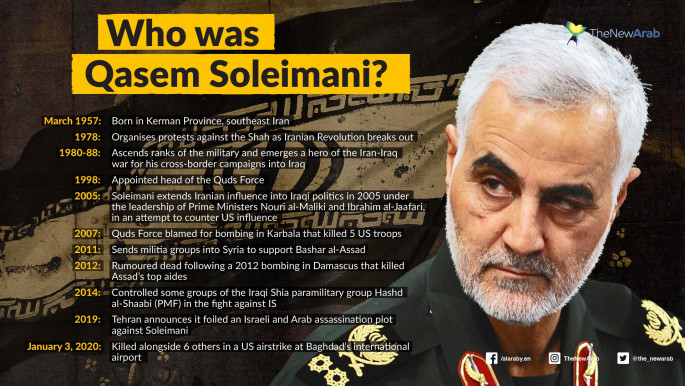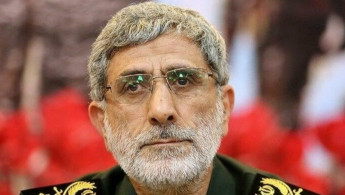Iran names Quds Force number two Esmail Qaani to replace slain Soleimani
"Following the martyrdom of the glorious general haj Qassem Soleimani, I name Brigadier General Esmail Qaani as the commander of the Quds Force of the Islamic Revolutionary Guard Corps," the supreme leader said in a statement posted on his official website.
Qaani was described by Khamenei as one of the "most decorated commanders" of the Revolutionary Guards during the 1980-88 Iran-Iraq war.
"The orders for the [Quds] force remain exactly as they were during the leadership of martyr Soleimani," Khamenei said.
|
|
"I call on the members of the force to be present and cooperate with General Qaani and wish him divine prosperity, acceptance and guidance."
Khamenei's announcement followed hours of speculation as to who would replace Soleimani as commander of the Revolutionary Guards' foreign operations arm.
As head of the Quds Force, Soleimani was widely seen as the architect behind Iran's regional expansionism, masterminding the Islamic Republic's moves in Syria, Lebanon, Iraq and Yemen. Among supporters and even foes, the Quds Force chief was seen as a charismatic leader.
Earlier on Friday, Khamenei announced three days of national mourning in response to the strike that killed Soleimani and Iraqi ally Abu Mahdi al-Muhandis, deputy commander of the Tehran-backed Popular Mobilisation Forces, or Hashd al-Shaabi.
In Tehran, tens of thousands of people took to the streets to protest against American "crimes", an AFP correspondent reported.
Chanting "Death to America" and holding up posters of Soleimani, the demonstrators filled streets for several blocks in central Tehran after Friday prayers.
In a video shared by Iran's semi-officials Fars news agency, huge crowds of people were also pictured mourning Soleimani in the commander's hometown of Kerman in the country's southeast.
 |
Promises of vengeance from Iran, Iraq
Iranian officials have pledged a swift response to the attack.President Hassan Rouhani said Iran and the "free nations of the region" would take revenge on the US for "this gruesome crime".
His death had "redoubled the determination of the nation of Iran and other free nations" to stand against the US, Rouhani said.
His statement was echoed by Hassan Nasrallah, leader of the Iran-backed Hezbollah militant group, who said "meting out the appropriate punishment to these criminal assassins... will be the responsibility and task of all resistance fighters worldwide".
In Iraq, where the Baghdad strike on Soleimani also killed Abu Mahdi al-Muhandis, deputy commander of Hashd al-Shaabi, Iran-backed militia leaders also promised revenge.
Hashd al-Shaabi, or the Popular Mobilisation Forces, is a network of mostly Shia armed factions, many of whom have close ties to Tehran.
|
|
"All fighters should be on high alert for upcoming battle and great victory," said Qais al-Khazali, chief of the Iran-backed Asaib Ahl al-Haq (League of the Righteous) militia, according to Reuters.
"The price for the blood for the martyred commander Abu Mahdi al-Muhandis is the complete end to American military presence in Iraq," the militia leader said.
Khazali's Asaib Ahl al-Haq is one of the founding militias part of Muhandis' Hashd al-Shaabi.
Hadi al-Amari, commander of the Iran-backed Badr Organisation, called on Iraqi forces to join together and expel foreign troops from the country. The Badr Organisation is also a part of Hashd al-Shaabi.
"We call on all national forces to unify their stance in order to expel foreign troops whose presence has become pointless in Iraq," he said according to Reuters.
Brigadier General Mohammad Reza Naqdi, deputy commander of the Revolutionary Guards for coordination, made the threat even more explicit: "The White House must either close its military bases in the Islamic region or go to the market to purchase coffins for its troops."
"The decision is up to them because we do not like to shed blood," he added.
The US strike on Soleimani and Muhandis came after a two-day siege on the US embassy in Baghdad by Hashd al-Shaabi supporters, furious over airstrikes by Washington that killed at least 25 militants from the forces' Kataib Hezbollah group.
In contrast to the Iranian and Iraqi leaders' demands for the US to withdraw troops from Iraq, Trump ordered an additional 750 be deployed to the region in the wake of the embassy attack.
Follow us on Twitter and Instagram to stay connected





 Follow the Middle East's top stories in English at The New Arab on Google News
Follow the Middle East's top stories in English at The New Arab on Google News
![The UAE is widely suspected of arming the RSF militia [Getty]](/sites/default/files/styles/image_330x185/public/2024-11/GettyImages-472529908.jpg?h=69f2b9d0&itok=Yauw3YTG)
![Netanyahu furiously denounced the ICC [Getty]](/sites/default/files/styles/image_330x185/public/2024-11/GettyImages-2169352575.jpg?h=199d8c1f&itok=-vRiruf5)
![Both Hamas and the Palestinian Authority welcomed the ICC arrest warrants [Getty]](/sites/default/files/styles/image_330x185/public/2024-11/GettyImages-2178351173.jpg?h=199d8c1f&itok=TV858iVg)